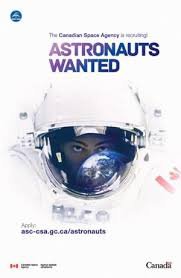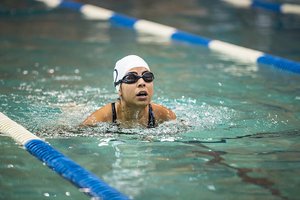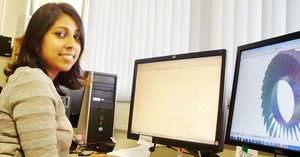Aiming high: Dr Priyanka Dhopade's astronaut journey
 In the summer of 2016, a call went out for applications to a recruitment programme for two new astronauts to join the
Canadian Astronaut Corps. Dr Priyanka Dhopade knew straight away that she would be submitting an application:
In the summer of 2016, a call went out for applications to a recruitment programme for two new astronauts to join the
Canadian Astronaut Corps. Dr Priyanka Dhopade knew straight away that she would be submitting an application:
'For as long as I can remember, I have dreamed of space exploration. I have always been driven by the idea that there is a universe out there for us to explore. This drive has taken me from being a little girl admiring Roberta Bondar's poster on my bedroom wall, to a researcher in aerothermodynamics at Oxford University. All along, I knew that if I persevered, I could eventually qualify to travel to space, like Bondar and Julie Payette did, many years ago. They were incredible role models, scientists, astronauts. Now it was my turn to lead.'
The selection process is long and extremely rigorous. The Canadian Space Agency is looking for exceptional people with excellent health, a university education in science, engineering or medicine, and extensive knowledge and experience. In the end, more than 3,700 people applied. A written exam whittled this down to about 1,700, including Priyanka. By February 2017, following arduous physical tests, there were just 72 candidates left in the running, and Priyanka was one of them, an amazing achievement.

'The competition to be an astronaut with the Canadian Space Agency's Astronaut Corps has been an exciting journey – the recruitment process is still ongoing, they have just narrowed down from the top 72 to the top 32 candidates for the next round (they will choose only 2 by summer 2017). Unfortunately, I did not make it to the next round, so I am no longer in the running. However, making it from 3,772 candidates to 72 has been a fascinating, tough, yet motivating experience.
'Have a look at this short video made by the Canadian Space Agency (you can spot me at 1:09 receiving instructions for the swimming exercise and 1:27 in the pool!).'
Priyanka's research, based at the Osney Thermofluids Laboratory, involves creating computer models of jet engines to better predict the heat transfer inside the engine. Jet engines are designed to work at extremely high temperatures, pressures and accelerations. At some points in the engine, the temperature of the air can be greater than the melting point of the parts inside, which means that they need to be cooled using cold air from the front half of the engine. More efficient cooling methods result in more efficient jet engines, reducing fuel consumption and harmful emissions, so the impact of this research on aviation's environmental cost could be significant.
 Rolls Royce, which provides funding for the research, is already implementing the results in its next generation of jet engines. 'I love that I can see a direct impact from my research, and its immediate application,' said Priyanka. 'Our highly collaborative work has great potential for the whole global economy. That collaboration is integral to space exploration, too, our progress depends on a truly global effort. I really value that.'
Rolls Royce, which provides funding for the research, is already implementing the results in its next generation of jet engines. 'I love that I can see a direct impact from my research, and its immediate application,' said Priyanka. 'Our highly collaborative work has great potential for the whole global economy. That collaboration is integral to space exploration, too, our progress depends on a truly global effort. I really value that.'
Priyanka does not intend to leave her dream of space travel behind. 'I have about 8 years, until the next application round, to develop my skills. I want to get my pilot's licence, and improve my understanding and experience of hypersonics and orbital mechanics.' You can only believe she will succeed.